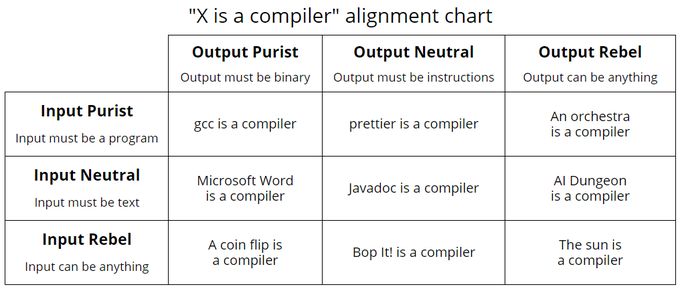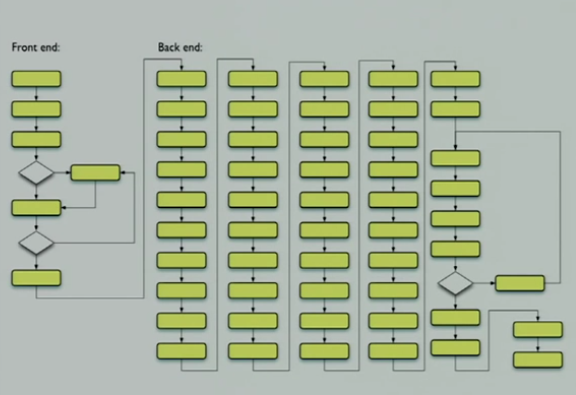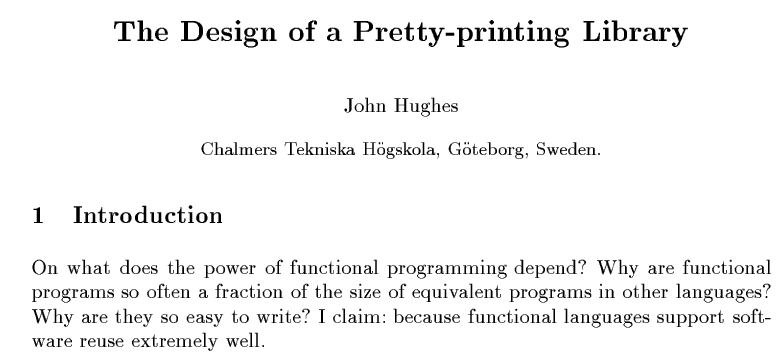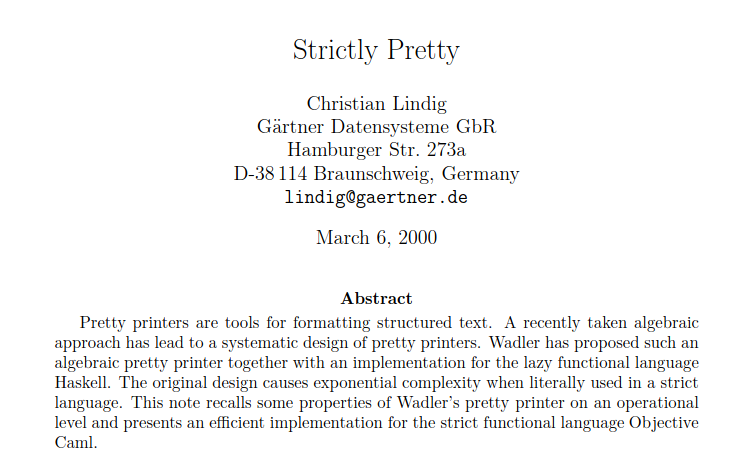class: center, middle # Elixir Flavoured Erlang Erlang User Group Meetup Mariano Guerra [@warianoguerra](https://twitter.com/warianoguerra) <p style="font-size:0.5em">By day I make programming languages that don't look like programming languages at [instadeq.com](https://instadeq.com/)<p> --- [@steveklabnik](https://twitter.com/steveklabnik/status/943208854141243398) ``` you: *sobbing* please stop... you cant just say everything is a compiler! me: *points at documentation tooling* compiler ``` --- class: center [@SeaRyanC](https://twitter.com/SeaRyanC/status/1334233376509763585)  --- class: center  --- # The Sun is a Compiler * A compiler is something that **takes a representation as input** * potentially the output of a previous transformation * and **transforms it into another representation as output** * the output representation is more suitable for some operations this compiler cares about --- # 🍅 Compilers 🍅 Transpilers Usually if the output representation is closer to the computer it's called compiler If it goes sideways it's called transpiler If it goes in reverse it's called a decompiler (or pretty printer) --- class: center # Elixir Flavoured Erlang Kind of sideways, a little upwards <video src="img/clinton.mp4" autoplay loop> --- # Elixir Flavoured Erlang Sideways: Transpiles Erlang to Elixir Upwards: Elixir is a Superset of Erlang [github.com/marianoguerra/efe](https://github.com/marianoguerra/efe) [github.com/marianoguerra/otp.ex](https://github.com/marianoguerra/otp.ex) [Blog Post](http://marianoguerra.org/posts/elixir-flavoured-erlang-an-erlang-to-elixir-transpiler/) --- # Elixir is a Superset of Erlang * Rebind Variables + ^ Match Operator * Nested Modules * Structs * Protocols * Macros --- # Erlang is a Superset of Elixir * Named Lambda Functions * Expressions in Bitstrings * Comprehensions without Generators * Scoping --- # Erlang is a Superset of Elixir * Binary Operators * Non Short Circuit Boolean Operators * Constant Expressions in Match Position * Catch Expression --- # Erlang Flavoured Elixir ```elixir for f <- :filelib.wildcard('./_build/dev/lib/*/*/*.beam') do result = :beam_lib.chunks(f,[:abstract_code]) {:ok,{_,[{:abstract_code,{_,ac}}]}} = result code = :erl_prettypr.format(:erl_syntax.form_list(ac)) out_path = :string.replace(f, '.beam', '.erl') :file.write_file(out_path, code) end ``` --- # How does it work: Erlang Specific * Lexer (Text 👉🏾 Token Stream) * Pre Processor + pp: includes, macros (Tokens 👉🏾 Tokens 👉🏾 AST) + exp: expands records to tuples (AST 👉🏾 AST) --- # How does it work: Shared * Parser (AST/absform) + Elixir/Gleam * Core Erlang (Tree) + LFE * Kernel Erlang (Tree) * SSA (Graph) * Codegen (Seq 👉🏾 Bytes) --- # And Elixir? * Lexer + `foo1.ex` 👉🏾 Token Stream * Parser + Tokens 👉🏾 AST ex (Macro Expasion) * Translator + AST ex 👉🏾 AST erl (absform) * 👉🏾 Enters the Erlang Compiler Stack --- # How to see them ``` erlc +to_pp foo1.erl erlc +to_exp foo1.erl erlc +to_core foo1.erl erlc +to_kernel foo1.erl erlc +dssa foo1.erl erlc +to_asm foo1.erl ``` --- # Input ```erlang -module(foo1). -export([f1/2, f2/2]). -define(OPEN, (A,). -define(CLOSE, B)). -define(OP, A + B). f1?OPEN ?CLOSE -> f2(B, A). f2?OPEN ?CLOSE -> ?OP * 2. ``` --- # PP and Exp ```erlang {function,8,f1,2, [{clause,8, [{var,8,'A'},{var,8,'B'}], [], [{call,8,{atom,8,f2},[{var,8,'B'},{var,8,'A'}]}]}]}. {function,9,f2,2, [{clause,9, [{var,9,'A'},{var,9,'B'}], [], [{op,9,'+', {var,9,'A'}, {op,9,'*',{var,9,'B'},{integer,9,2}}}]}]}. ``` --- # Core Erlang ```erlang 'f1'/2 = fun (_0,_1) -> apply 'f2'/2 (_1, _0) 'f2'/2 = fun (_0,_1) -> let <_2> = call 'erlang':'*' (_1, 2) in call 'erlang':'+' (_0, _2) 'module_info'/0 = fun () -> call 'erlang':'get_module_info' ('foo1') 'module_info'/1 = fun (_0) -> call 'erlang':'get_module_info' ('foo1', _0) ``` --- # Kernel Erlang ``` erlang fdef 'f1'/2(_0, _1) = match _0,_1 enter (local 'f2'/2)(_1, _0) end >> <> fdef 'f2'/2(_0, _1) = match _0,_1 do bif (remote 'erlang':'*'/2)(_1, 2) >> <_2> then do bif (remote 'erlang':'+'/2)(_0, _2) >> <_3> then <<_3>> end >> <> fdef 'module_info'/0() = match enter (remote 'erlang':'get_module_info'/1)('foo1') end >> <> fdef 'module_info'/1(_0) = match _0 enter (remote 'erlang':'get_module_info'/2)('foo1', _0) end >> <> end ``` --- # SSA ```erlang function foo1:f1(_0, _1) { 0: @ssa_ret:3 = call local literal f2/2, _1, _0 ret @ssa_ret:3 1: @ssa_ret = call remote (literal erlang):(literal error)/1, literal badarg ret @ssa_ret } function foo1:f2(_0, _1) { 0: _2 = bif:'*' _1, literal 2 @ssa_bool = succeeded _2 br @ssa_bool, label 3, label 1 3: _3 = bif:'+' _0, _2 @ssa_bool:4 = succeeded _3 br @ssa_bool:4, label 5, label 1 5: ret _3 1: @ssa_ret = call remote (literal erlang):(literal error)/1, literal badarg ret @ssa_ret } function foo1:module_info() { 0: @ssa_ret:3 = call remote (literal erlang):(literal get_module_info)/1, literal foo1 ret @ssa_ret:3 1: @ssa_ret = call remote (literal erlang):(literal error)/1, literal badarg ret @ssa_ret } function foo1:module_info(_0) { 0: @ssa_ret:3 = call remote (literal erlang):(literal get_module_info)/2, literal foo1, _0 ret @ssa_ret:3 1: @ssa_ret = call remote (literal erlang):(literal error)/1, literal badarg ret @ssa_ret } ``` --- # Codegen ```erlang {function, f1, 2, 2}. {label,1}. {line,[{location,"foo1.erl",8}]}. {func_info,{atom,foo1},{atom,f1},2}. {label,2}. {move,{x,1},{x,2}}. {move,{x,0},{x,1}}. {move,{x,2},{x,0}}. {call_only,2,{f,4}}. ``` --- # Codegen ```erlang {function, f2, 2, 4}. {label,3}. {line,[{location,"foo1.erl",9}]}. {func_info,{atom,foo1},{atom,f2},2}. {label,4}. {line,[{location,"foo1.erl",9}]}. {gc_bif,'*',{f,0},2,[{x,1},{integer,2}],{x,1}}. {line,[{location,"foo1.erl",9}]}. {gc_bif,'+',{f,0},2,[{x,0},{x,1}],{x,0}}. return. ``` --- class: center, middle Follow [@leostera](https://twitter.com/leostera) Check [LAM](https://github.com/AbstractMachinesLab/lam) and [Caramel](https://github.com/AbstractMachinesLab/caramel) --- class: center A Compiler is Made of Compilers  --- class: center [nanopass](http://nanopass.org/)  ??? The Nanopass Framework is an embedded domain-specific language for creating compilers that focuses on creating small passes and many intermediate representations. Nanopass reduces the boilerplate required to create compilers making them easier to understand and maintain. --- # Turbo Pascal is a Compiler ``` A one-pass compiler emits assembly right during parsing, without creating an intermediate representation, such as an AST ``` [One-pass Compiler Primer](https://keleshev.com/one-pass-compiler-primer) --- class: center  [The Design of a Pretty-printing Library](https://www.researchgate.net/publication/2819607_The_Design_of_a_Pretty-printing_Library) --- class: center  [Strictly Pretty](https://www.researchgate.net/profile/Christian_Lindig/publication/2629249_Strictly_Pretty/links/5c2a0b8d92851c22a350bb79/Strictly-Pretty.pdf) --- # Abstract Representation * above * beside * break * follow * nest * par * sep * text --- # Concrete Representation ```elixir doc = :prettypr.follow(:prettypr.text('a'), :prettypr.text('b')) 👉🏾 {:beside, {:sep, [text: [1, 97], text: [0]], 0, true}, 👉🏾 {:text, [1, 98]}} paper = 80 ribbon = 56 :prettypr.format(doc, paper, ribbon) 👉🏾 'a b' ``` [prettypr.erl](http://erlang.org/doc/man/prettypr.html) --- # The BEAM as a proto-language A language family is a group of languages related through descent from a common ancestral language or parental language, called the proto-language of that family A proto-language is a postulated language from which a number of attested known languages are believed to have descended by evolution, forming a language family --- class: center, middle # Elixir Flavoured Erlang Erlang User Group Meetup Mariano Guerra [@warianoguerra](https://twitter.com/warianoguerra) --- # A Programming Language is An agreed unambiguous representation between humans and computers That a human can (confortably?) express And a computer can (efficiently?) run --- # English is not a programming language It can't be unambiguously compiled to a representation a computer can run --- # Powerpoint is a programming language [On the Turing Completeness of MS PowerPoint](https://www.andrew.cmu.edu/user/twildenh/PowerPointTM/Paper.pdf] [Accidentally Turing-Complete](http://beza1e1.tuxen.de/articles/accidentally_turing_complete.html) --- # Decrement and branch if nonzero is a programming language ``` A one-instruction set computer, is an abstract machine that uses only one instruction – obviating the need for a machine language opcode. With a judicious choice for the single instruction and given infinite resources, an OISC is capable of being a universal computer ``` [One-instruction set computer](https://en.wikipedia.org/wiki/One-instruction_set_computer)